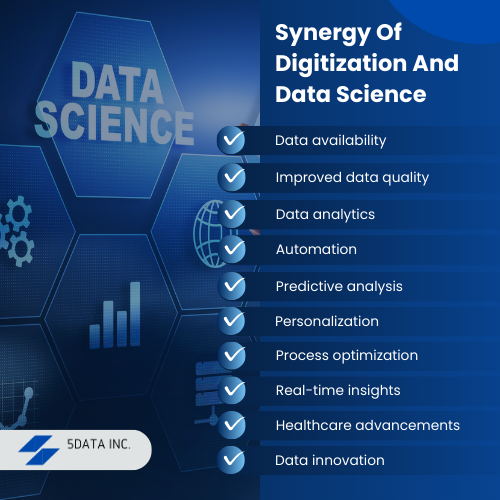Driving innovation and business growth in modern times is a never-ending process. However, the invention of technology in business and data analytics has yielded positive results in many aspects of business. Data science and innovation are now inseparable partners, driving progress across industries and transforming problem-solving, business model creation, and decision-making.
What we cover in this blog
Digitization
Data digitization is the process of converting analog information, such as paper documents, images, audio, and video, into digital formats that can be stored, processed, and analyzed using computers. This conversion involves several key steps:
- Data capture: This is the initial step where analog data is captured through various means, including scanning, image capture, or transcription.
- Data conversion: The captured data is converted into digital formats. For text, Optical Character Recognition (OCR) is commonly used to do image recognition and convert printed or handwritten text into machine-readable text. Data collection and data management service providers assist firms and data scientists in working through various data.
- Data storage: The digitized data is stored in electronic files or databases, making it easy to organize and retrieve.
- Data cleaning: Data quality is important. This step involves removing errors, inconsistencies, and redundancies from the digitized data.
- Data indexing and metadata: Proper indexing and metadata are added to AI algorithms to help categorize and search for data efficiently.
- Data security: Protecting digitized data from unauthorized access or loss is crucial for data privacy. Encryption and access control measures are implemented.
- Data accessibility: Once digitized, data can be accessed and manipulated more easily. It can allow both structured and unstructured data to be shared, transmitted, and analyzed more effectively.
- Data analysis: After digitization, data can be subjected to various data analysis techniques to make data scientists extract valuable insights and make informed decisions.
Data digitization offers numerous benefits, including improved data management, reduced storage costs, faster data retrieval, and the ability to leverage data for analytics, machine learning models, and artificial intelligence applications. It is particularly valuable in industries where large volumes of historical analog data need to be modernized and made more accessible.
Importance Of Data Analytics And Data Sciences
Data science is a multidisciplinary field that uses techniques, algorithms, and processes to extract insights from structured and unstructured data. Combining statistics, computer science, and data analysis, data scientists collect, clean, process, and analyze data to uncover patterns and correlations. They use programming languages, machine learning, data visualization, and data mining to work with data effectively.
Data science is of significant importance in today’s digital age for several reasons:
1. Informed decision-making:
Data science helps organizations make data-driven decisions, which are often more accurate and reliable than decisions based solely on intuition or past experiences.
2. Predictive analytics:
This enables businesses to predict future trends, changing customer behavior and other market trends and dynamics, allowing them to plan and adapt proactively.
3. Competitive advantage:
Companies that effectively harness data science and artificial intelligence can gain a competitive edge by understanding their customers better, developing innovative products and services, changing customer behavior, and staying ahead in the market.
4. Personalization:
Data science facilitates the personalization of services and products, enhancing customer experiences and loyalty.
5. Healthcare advancements:
In the healthcare sector, a deeper understanding of natural language processing models is used for disease prediction, treatment recommendations, and drug discovery, leading to improved patient care.
6. Scientific research:
It accelerates scientific discovery by analyzing and interpreting large datasets, making breakthroughs in fields like genomics, climate science, and particle physics.
7. Risk management:
Data science and artificial intelligence are crucial in finance and insurance for risk assessment, fraud detection, data analytics, and portfolio management.
8. Marketing and advertising:
It enables targeted advertising across social media platforms, customer segmentation, and campaign optimization, maximizing marketing ROI.
9. Smart cities and IoT:
Data science plays a role in managing and analyzing data from the Internet of Things (IoT) devices, making cities more efficient and sustainable.
10. Cybersecurity:
It helps detect and prevent cyber threats through anomaly detection and real-time monitoring of network traffic.
11. Environmental sustainability:
Data science is used in environmental monitoring and analysis, aiding in efforts to combat climate change and protect natural resources.
12. Education and personal development:
It can personalize educational content and track student progress, facilitating personalized learning experiences.
13. Human resources:
Data science assists business executives in talent acquisition, employee retention, and performance optimization within organizations.
14. Social impact:
It can address societal issues like poverty, healthcare access, and disaster response by analyzing data to inform policy and intervention decisions.
15. Efficiency and productivity:
Data driven by science can optimize processes, reduce inefficiencies, and automate tasks, leading to improved business growth, operational efficiency, and productivity.
In summary, data science is crucial in a wide range of fields and industries, offering insights, efficiency, and innovation that can drive progress and improvements in various aspects of our lives.

Synergy Of Digitization And Data Science
The synergy of digitization and data science is a powerful combination. Digitization involves the conversion of information and processes into digital formats, while data science focuses on extracting insights and knowledge from data. When these two fields come together:
1. Data availability:
Digitization makes data more accessible and available in digital form, with vast datasets that data scientists can use for analysis and decision-making.
2. Improved data quality:
Digitization processes often include data cleansing and validation, which enhances the raw data quality and makes it more suitable for analysis.
3. Data analytics:
Data scientists from expert data life cycle management services can leverage digitized data to perform advanced analytics, uncover patterns, transform raw data into data-driven insights, and make data-driven decisions.
4. Automation:
Digital processes and data assets can be automated, generating vast amounts of data. Data science helps in processing and deriving valuable insights from this data at scale.
5. Predictive analysis:
By analyzing historical digitized data, data science can predict future trends, exceptional customer experiences, and behaviors, aiding businesses in making proactive decisions.
6. Personalization:
Digitization and big data science enable the personalization of services and products based on individual customer preferences and behaviors.
7. Process optimization:
Businesses can use data science and machine learning to optimize digitized processes, reducing inefficiencies and improving customer satisfaction and productivity.
8. Real-time insights:
With digitization, in real-world examples of time, data-driven insights can be collected and analyzed instantly, allowing for immediate decision-making.
9. Healthcare advancements:
In the digital age of healthcare, technological advancements in digitization and data science are revolutionizing patient care, diagnosis, and treatment through electronic health records and predictive analytics.
10. Data innovation:
The synergy of digitization and data science fosters innovation as organizations discover new ways to leverage data assets for competitive advantage.
Conclusion
Overall, the integration of digitization and data science has the potential to transform industries and drive efficiency, innovation, and better decision-making. Overall, the combination of digitization and data science provides a fertile ground for driving innovation and the synergy of digitization and data science across various sectors, leading to novel solutions, exceptional customer experiences, improved processes, and enhanced experiences for individuals and organizations alike.

